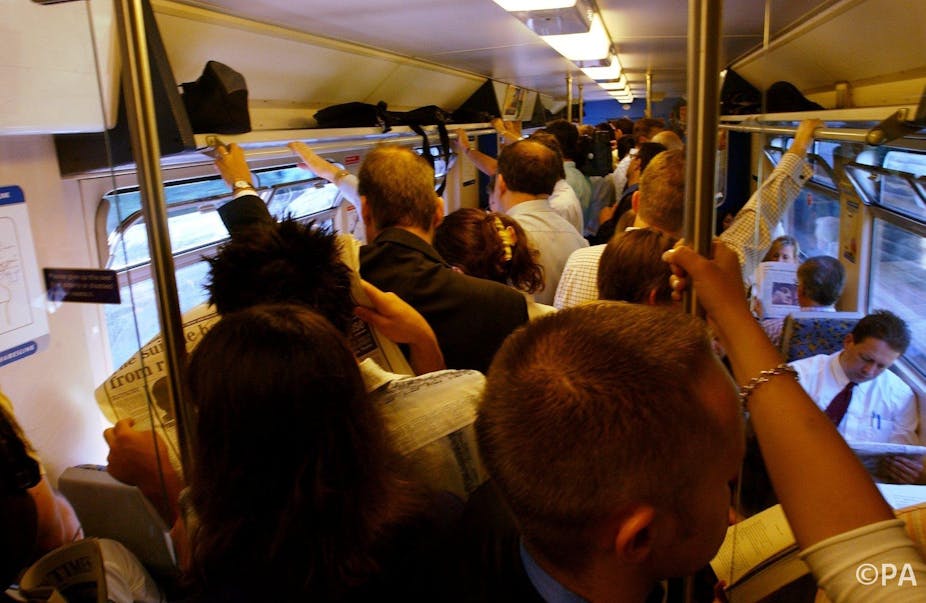This year, train fares will increase by an average of 2.2%, even though wage growth in 2014 remained below inflation for many people. Inevitably this will lead to complaints of overpricing, as the government seeks to reduce the subsidy offered by taxpayers to railway companies.
Passenger groups and commuters will highlight the cost of season tickets, environmental groups will draw the link between fare prices and climate change, while train companies and Network Rail will stress the importance of upgrading railways to maintain and improve a network that dates back to the 19th century.
And while this debate is important, particularly for people feeling the pinch, it is potentially far too simplistic. The debate seems to be limited to finding an acceptable rate of fare increases. It masks the fact that there are inequalities in the ticket pricing structure that operates in the UK which need to be changed, irrespective of any price rises.
Supply and demand
Train prices bear little resemblance to the length of a journey. The London to Edinburgh line is an excellent example of this. An anytime single ticket from London to Edinburgh cost £152 in 2014. That’s just £1.50 more than the fare from London to Newcastle, even though the two cities are more than 100 miles apart. The same ticket from London to Berwick-upon-Tweed – which is roughly halfway between these two cities – costs just 50p less at £151.50.
Travellers from London to Edinburgh are highly likely to pass through both Newcastle and Berwick–upon-Tweed but passengers getting on at these stations will pay considerably more for their journey than people who boarded the train at London. A ticket from Newcastle to Edinburgh costs £51.50 and one from Berwick-upon-Tweed costs £24.70 - 4940% more than the marginal cost to a traveller from London (50p) pays for the miles covered on the way.
Consistently inconsistent
This is just one example, but all over the country, people travelling on exactly the same trains at exactly the same speed, purchasing tickets at exactly the same time, pay different prices for their journey, due to the absence of integrated ticketing prices. Price differences typically occur when passengers change trains or when they change train operators.
A standard-class ticket purchased on the day of travel from Macclesfield to Widnes, both of which are in Cheshire (though the journey between the two involves changing trains in Greater Manchester), costs £16.60. But by splitting tickets from Macclesfield to Stockport (£5.90) and then Stockport to Widnes (£9.60) anyone making this journey could save £1.10 (6.6%).
Here the fastest journeys for the first leg involve travelling on Virgin or Crosscountry trains, whilst on the second leg they involve using East Midlands trains.
For some journeys, it is even cheaper to buy a ticket to a station further away than your destination (in terms of rail travel). An off-peak single ticket from Cheltenham to Cardiff costs £17.40, yet the same off-peak single ticket from Cheltenham to Wye Valley (a journey which involves a change at Cardiff) costs just £13.60.
When is a deal not a deal?
Advance tickets and railcards don’t necessarily make travel cheaper either, and both are highly affected by demand. Train companies often advertise that advance tickets can be bought up to 12 weeks before travel but that’s not the same as guaranteeing that the cheapest train tickets are released 12 weeks before the date of departure. Such prices are released at the discretion of the train company. Indeed, in many high-demand periods, such as during school holidays or over Christmas, the cheapest tickets are not released 12 weeks before.
And your railcard might look like a cost-saving purchase, but it can often only be used at certain times of day, or with minimum fare restrictions. It can sometimes even be cheaper to travel without a railcard than using one.
Many travellers are unaware of these inconsistencies and continue to focus on the annual January price hike when appealing for a fairer system. Part of the problem is the fact that fares have become so complicated, with advanced purchase tickets, railcards and other group discounts further muddying the waters.
But this is exactly how train companies will counter opposition to train fare increases this and every other January. They will maintain that cheap fares do exist (without mentioning that these are limited to advance tickets), and indeed, taking the time to navigate the confusing world of ticket purchasing can yield results.

But the extent to which it is possible to get a cheap deal is, in most cases, very limited and finding those tickets involves a level of time commitment that most people will not be willing to make.
Train companies should have some responsibility for making sure commuters can get the cheapest tickets more easily. It is also time for an integrated ticketing system that means travellers switching trains or travelling with different train operators don’t get a raw deal.
Ticketing structures for train journeys need to be overhauled as a matter of urgency if passengers are to have any confidence in planned fare increases. That is the argument they should be making, regardless of how much prices go up by.

